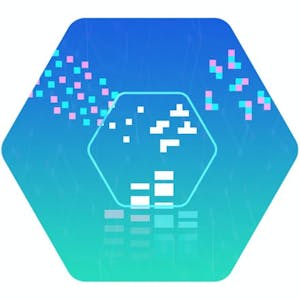Experience a comprehensive exploration of serverless data processing with the "Serverless Data Processing with Dataflow: Develop Pipelines" course. Delve into advanced concepts of Apache Beam SDK and gain proficiency in developing pipelines for processing streaming data.
This course is designed to equip you with the knowledge and skills required to harness the power of Dataflow for efficient and scalable data processing. Throughout the course, you will explore various topics, such as windowing, watermarks, triggers, sources and sinks, schemas for structured data expression, stateful transformations using State and Timer APIs, and best practices for optimizing pipeline performance.
Furthermore, you will learn how to employ SQL and DataFrames to represent business logic within Beam and iteratively develop pipelines using Beam notebooks. The hands-on labs included in this course provide valuable practical experience, enabling you to apply the concepts and techniques learned in real-world scenarios.
Upon completion of this course, you will have the expertise to create and optimize data processing pipelines using Google Cloud Dataflow, ensuring the reliability, scalability, and efficiency of your data processing workflows.
Certificate Available ✔
Get Started / More Info
This comprehensive course comprises modules covering Apache Beam concepts, streaming data processing, sources and sinks, stateful transformations, best practices, SQL, DataFrames, and iterative pipeline development using Beam notebooks.
Course Introduction: This module provides an overview of the course and essential information on downloading course resources and providing feedback. Prepare for hands-on labs and gain access to additional resources to support your learning journey.
Beam Concepts Review: Gain a deep understanding of the fundamental concepts of Apache Beam SDK, including utility transforms, DoFn lifecycle, and how to get started with Google Cloud Platform and Qwiklabs. Explore hands-on labs to write ETL pipelines using Apache Beam and Cloud Dataflow in both Java and Python.
Windows, Watermarks, Triggers: This module delves into the processing of streaming data using windows, watermarks, and triggers. Learn about batch and streaming analytics pipelines with Cloud Dataflow and execute hands-on labs to apply your knowledge in Java and Python environments.
Sources & Sinks: Explore the options for sources and sinks in your pipelines, including Text IO, File IO, BigQuery IO, PubSub IO, Kafka IO, and more. Understand the implementation of splittable DoFn and engage in practical application through the hands-on labs.
Schemas: Learn to express structured data using Beam schemas and gain insights into writing branching pipelines using Java and Python. Enhance your skills through hands-on labs designed to reinforce your understanding of schemas and branching pipelines.
State and Timers: Acquaint yourself with the State and Timer APIs for stateful transformations. Gain proficiency in utilizing state and timer APIs effectively to enhance the functionality of your pipelines. This module provides the foundation for optimizing data processing workflows.
Best Practices: Discover and implement best practices to maximize your pipeline performance. Explore techniques for handling un-processable data, error handling, utilizing DoFn lifecycle, and pipeline optimizations. Engage in advanced streaming analytics pipeline labs to apply these best practices in real-world scenarios.
Dataflow SQL & DataFrames: Uncover the capabilities of Dataflow and Beam SQL for representing business logic and mastering windowing in SQL. Additionally, learn about Beam DataFrames to enhance your expertise in batch and streaming analytics. Participate in hands-on labs to apply Dataflow SQL for both batch and streaming analytics in Java and Python.
Beam Notebooks: This module introduces Beam Notebooks and their role in iteratively developing pipelines. Gain familiarity with Beam Notebooks and their application in the context of pipeline development. Access additional resources to further enhance your understanding of Beam Notebooks.
Summary: Conclude your journey through the course with a comprehensive summary that captures the key takeaways and learnings from each module. Reflect on the knowledge gained and prepare to apply it in real-world scenarios to optimize data processing workflows.
This course will equip business professionals with the skills to extract, analyze, and present data effectively, enhancing their ability to address business issues...
Tidyverse Skills for Data Science in R offers a comprehensive exploration of the Tidyverse framework, covering data importing, wrangling, visualization, and modeling....
Data Mining Project offers hands-on experience in designing and implementing real-world data mining projects, providing step-by-step guidance from problem formulation...
Introduction to Microsoft Azure Synapse Analytics provides a comprehensive understanding of designing and implementing data solutions using Azure Synapse Analytics...